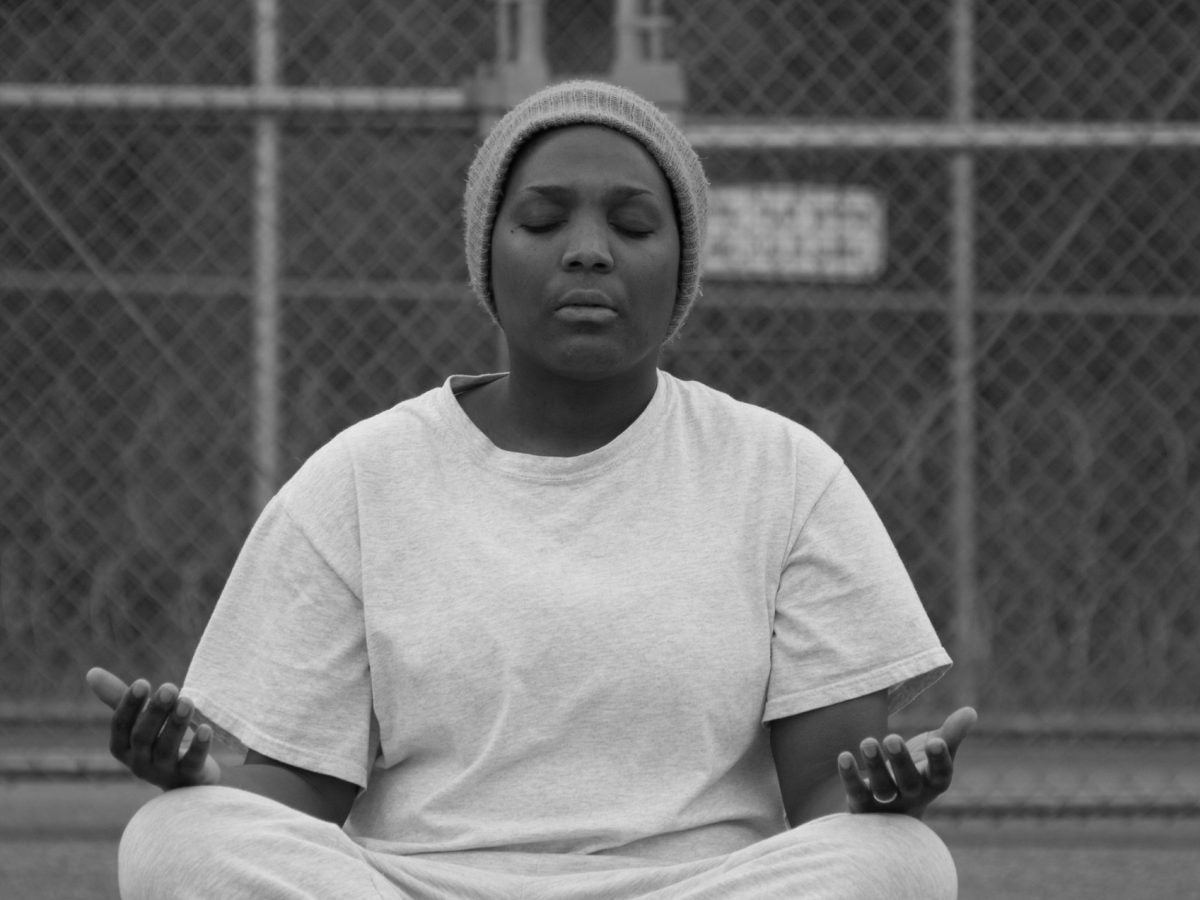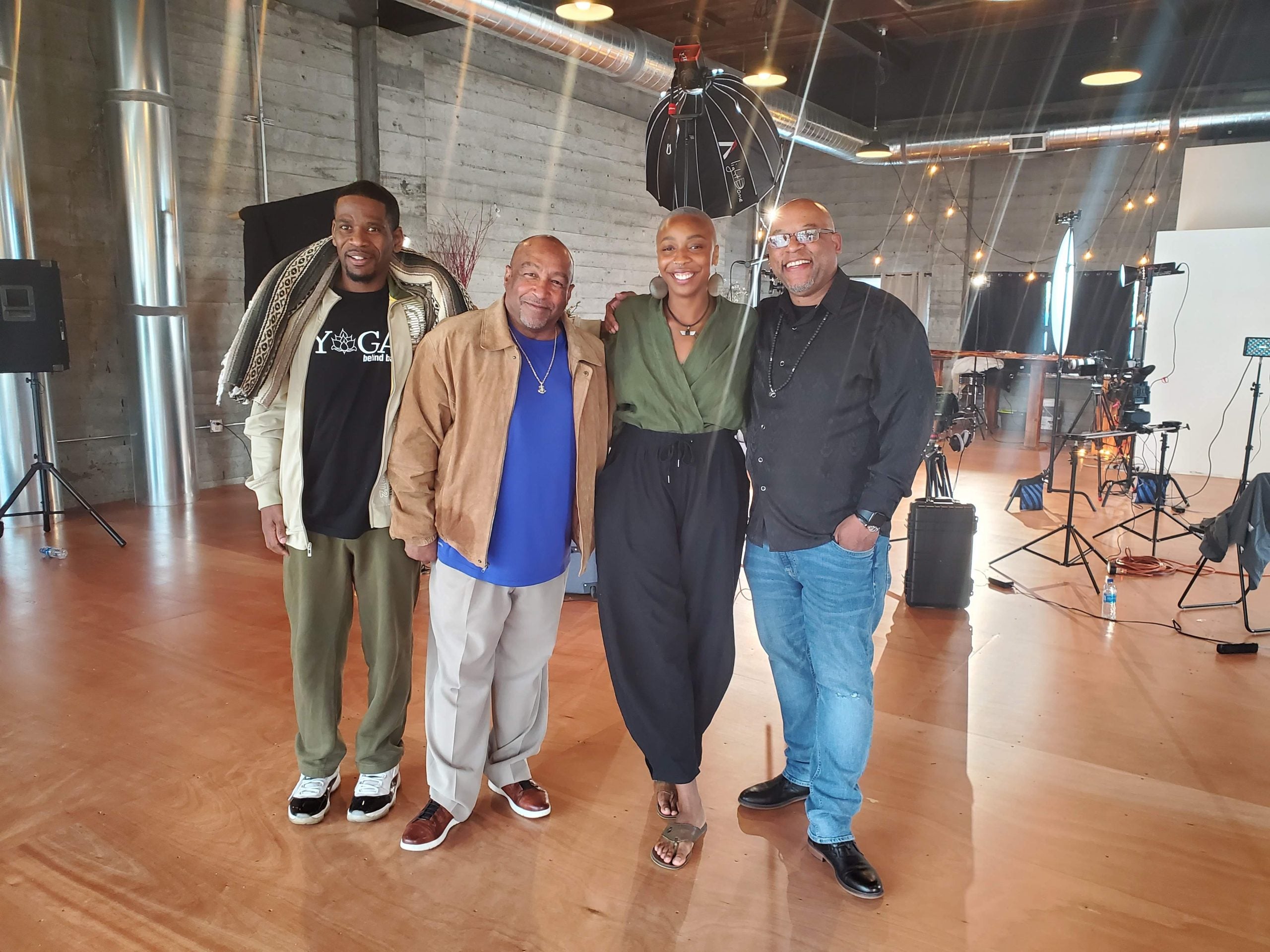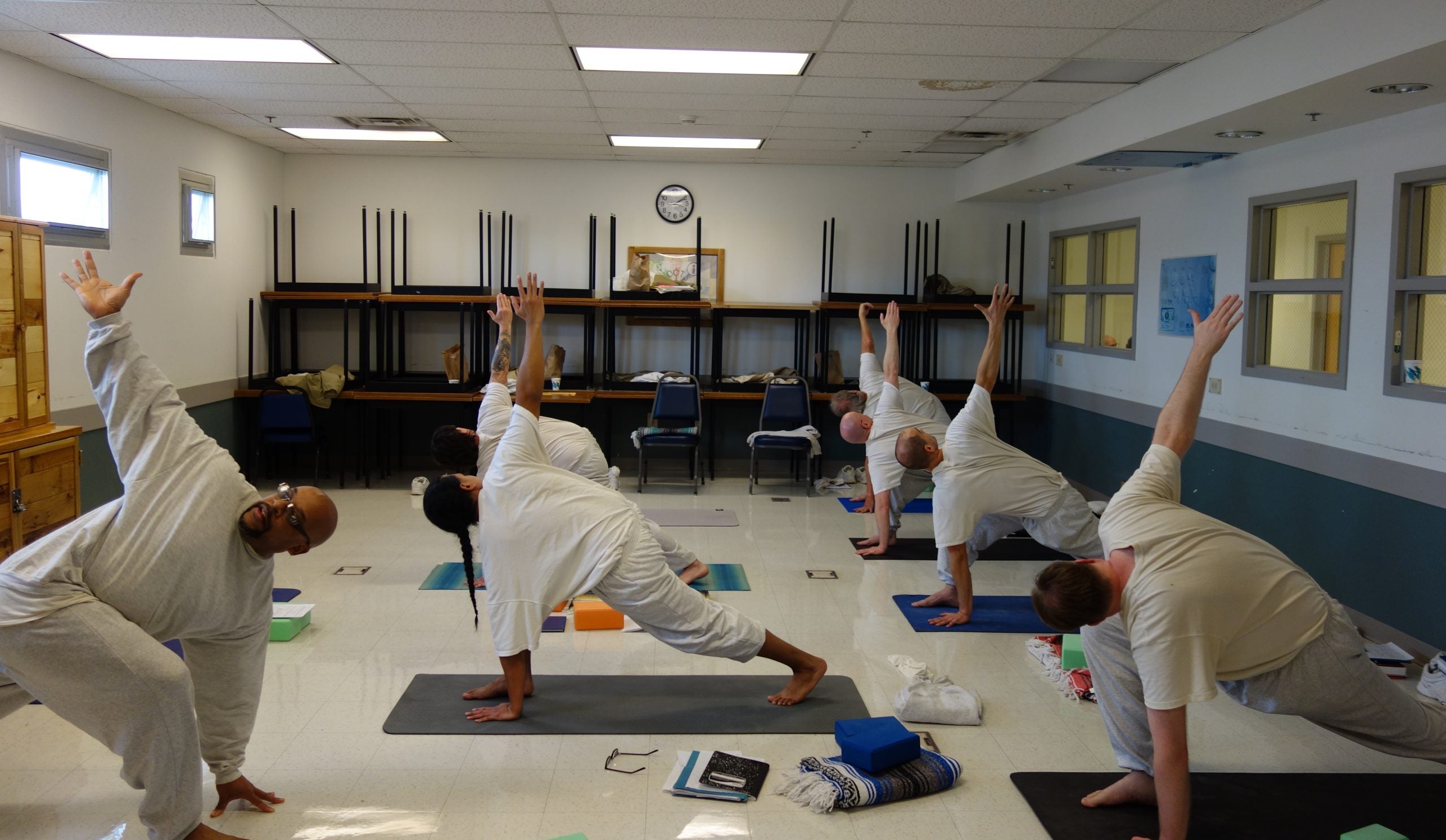
What does liberation look and feel like?
This is a question that requires tapping into our imagination, and it’s one that Yoga Behind Bars—an organization offering embodied movement and meditation classes to incarcerated people—encourages its community to ponder.
Since 2008, Yoga Behind Bars (YBB) has helped thousands of incarcerated individuals collectively reimagine liberation by encouraging personal transformation and rehabilitation, teaching stress management and inspiring resilience—all through the holistic power of trauma-informed yoga and meditation.
The Seattle-based nonprofit defines trauma-informed yoga as “accessible embodiment practices that encourage participants to reclaim their agency through choice, inclusion and nervous-system regulation.” According to Gabby Oglesby, co-executive director of YBB, “those three hallmarks are so crucial, especially as we are supporting folks who are incarcerated, because those are stripped away from them when they’re inside, and they are likely things that they didn’t have access to prior to their incarceration.”

Within the yoga world, however, “there’s a conversation that trauma-informed yoga is yoga; there is no difference,” Oglesby tells ESSENCE. “What the West has done to yoga is why we are having to go back and call it trauma-informed yoga. So, we’re returning back to yoga’s roots to decolonize it.”
In addition to its physical health benefits, trauma-informed yoga and meditation have been scientifically proven to cultivate self-regulation and mindfulness, improve emotional well-being and decision-making, and heal mental illness and trauma.
The vast majority of incarcerated individuals have significant complex trauma. This trauma includes discrimination, abandonment, systemic oppression, poverty and abuse. Enduring multiple traumas is a major cause of chronic stress, substance addiction and severe mental illness, all of which can statistically lead to incarceration.
We tend to look towards the justice system for justice, and what we get is injustice most of the time, especially for Black and Brown folk.
– Gabby Oglesby, co-executive director of Yoga Behind Bars
The United States has the highest incarceration rate in the world, with more than two million people behind bars. About 95 percent of individuals in state or federal prisons will rejoin society; however, within three years, an estimated 68 percent are arrested again.
Among the strongest predictors of recidivism (meaning the repeated relapse into crime) are trauma and poverty. According to the Prison Policy Initiative, formerly incarcerated people are less likely to have access to healthcare, and nearly 10 times more likely to be unhoused than the general public. Individuals with multiple arrests are disproportionately low-income, less educated, unemployed and Black. The criminalization of poverty, houselessness and mental illness—as well as the school-to-prison pipeline—continually pushes Black people who are in need of care into the criminal legal system.
As the Vera Institute of Justice states: “Mass incarceration has picked up where slavery left off, separating families and dehumanizing and traumatizing the descendants of enslaved people.”
To break this vicious cycle of incarceration, YBB regularly offers trauma-informed movement and meditation programs for incarcerated youth and adults. The organization advocates for restorative justice solutions that break down the social barriers that prevent incarcerated individuals from rebuilding their lives. Through trauma-sensitive yoga and meditation classes, students are given the inner tools they need to reclaim bodily autonomy through somatic mindfulness and breathwork practices and to address systemic and interpersonal trauma.
In 2020, the organization’s work came to a halt. For more than a year during the onset of the COVID-19 pandemic, individuals were unable to gather and teach in-person classes. Now, with restrictions lifted, YBB is working to rebuild relationships within the community and expand back into juvenile centers, mental health treatment units and other correctional facilities.

“We have this expression amongst the staff that I got from a book called ‘Emergent Strategy’ by adrienne maree brown: ‘Move at the speed of trust.’ That means we’re putting in efforts to build relationships within our own team structure, and with facilities and community members, so that we can honor a pace that feels sustainable and that is based off relationships we put time and effort into fortifying,” Oglesby tells ESSENCE. “So, slowly but surely, we are starting to reintegrate back into facilities. We want to make sure they know who we are, that we’re able to share what our vision is and how we want to move forward.”
Currently, YBB serves about 150 incarcerated people each week, and offers 15 yoga and meditation classes across more than six correctional facilities. Many of the organization’s classes are facilitated by TBBs, or teachers behind bars. Through the nonprofit’s long-standing Yoga Teacher Training Behind Bars program, incarcerated people are trained to become trauma-sensitive yoga instructors.
The Teachers Behind Bars program is part of YBB’s strong belief in creating opportunities for leadership in the prison system. And the numbers don’t lie: only eight percent of individuals who took four or more of YBB’s yoga and meditation classes returned to prison, compared with the national recidivism rate of 68 percent.
Starting with one yoga class in a downtown Seattle jail nearly 15 years ago, Yoga Behind Bars is now leading a movement beyond the State of Washington, with YBB-inspired programs in Maine, Colorado, Nebraska, West Virginia, Montana, Alaska and Kenya. The nonprofit is working directly with incarcerated and formerly incarcerated individuals to bring about much-needed change in the U.S. prison system.
“Building the table with the folks most impacted by the work transforms the work immediately, because they have a seat. They can use their voice, they can talk about the things they would like to see and help lead in that way,” Oglesby says. “It’s such an important piece of the work that we include and are led by folks who have been impacted.”
Looking ahead, YBB aims to continue expanding into additional correctional facilities to bring its transformative mission to more incarcerated people. The organization is also working on a “beyond bars” component, which is focused on sharing and providing necessary resources for formerly incarcerated individuals who are trying to rebuild their lives after being released.
“Our plan is to launch monthly classes for folks who are recently released and need somewhere to practice,” Oglesby continues. “That would include not only folks when they’re released … We want our donors [and] community members to come. We want it to be a really integrative space because I think, historically, nonprofits tend to keep those things very separate. Nah, we want to say: ‘Everybody come get this love, come get this healing.’ We want to create space for everybody to be able to just share and be in community, as a community would.”







For Oglesby, who is also an artist, an organizer and a certified yoga teacher, YBB is life’s work.
“This job, for me, intersects all the things that I’m really passionate about: social justice, healing, wellness, abolition,” she says. “We tend to look towards the justice system for justice, and what we get is injustice most of the time, especially for Black and Brown folks. This system systematically reduces people to a label, a crime, the worst point in their life, rather than zooming out and seeing them as holistic beings who are capable of transformation. I think YBB’s work is sharing that we believe you are capable of redemption, of transformation. And we want to see your humanity and honor it. That’s justice.”








